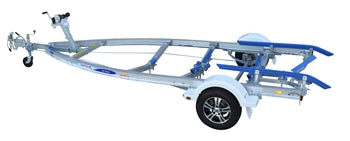
There are few greater thrills than buying a boat and taking it out on the water for a spin with the family. Whether you're trading up or acquiring your first boat, it's important to do your research to find out exactly which trailer is best suited to your vessel and your boating needs. Here, we break down the different types of boat trailer and what to look out for before you make your selection.

Buying a trailer requires just as much consideration as purchasing the boat itself.
Bunk trailers
Bunk trailers are fairly common, and are simple in structure. Comprised from a minimum of two long boards, known as bunks, bunk trailers support a boat's keel by supporting either side. These trailers are generally for smaller boats under six metres long. The boards of a bunk trailer are usually covered in a soft felt-like fabric to help the boat slide off easily, with the benefit of protecting the underside of the hull from scratches.
Roller trailers
Perfect for launching boats in shallow water, such as waterways or beaches at low tide. Roller trailers use a number of cylindrical pieces of plastic to support the boat's weight as you guide it into the water. When backing a roller trailer into the water, it's easiest to get the back of the boat floating first, and then back a little further to get the rear rollers slightly submerged. This way, you can use these rollers as a guide and correct your backing or angle to slide the boat into the water. If you're unsure how to determine whether the water will be low enough for you to launch your boat in, there are plenty of apps that inform you about the changing tides.
Float-on trailers
Larger boats generally need to be backed into a body of water, rather than pulled or lifted like smaller vessels. Float-on trailers are perfect for these boats as they're designed to be backed and submerged in water, floating the vessel with little effort.
Keel rollers
Though keel rollers aren't trailers by name, they function in essentially the same way. These rollers are placed in the centre of a trailer - usually in a ladder format - in order to support the boat's keel. This is of vital importance with aluminium boats as the strongest part of the boat is the keel. If you fit an aluminium boat on just a multi roller trailer with no keel support it can cause damage to the bottom sheets of the vessel.

It's key to measure the combined weight of your vehicle, trailer and boat to ensure that you're not exceeding your towing capacity.
What do I need to know before buying a trailer?
A boat trailer is a key investment that must be considered carefully. Think of it as purchasing new parts for your car. You wouldn't just throw in any old brake pads - you'd do your due diligence to make sure it's the perfect fit for your vehicle.
Brake calipers and rotors
When it comes to choosing a trailer, you'll need to take into account the brake calipers, which are used to press against the brake rotor and brake pads to slow the vessel. This all depends on the size of your boat. Smaller vessels generally have some form of brake override system, which is usually as simple as a cable that puts pressure on the calipers when you brake.
Large boats on the other hand need to have trailers with a battery powered electric hydraulic braking system, made up of small brakes on each wheel of the trailer. This helps in heightening brake sensitivity, vital when transporting large vessels. Furthermore, should a boat detach from the vehicle towing it, a break-away component will make sure the boat automatically stops, rather than rolling ahead.
Trailer weight
There is a little bit of measuring you need to do when considering how you're going to tow your boat.
- First, you'll need to find out the weight of your boat, trailer and vehicle.
- Add these values together to get a total weight.
- Once you have the total weight, compare the value to the gross combined vehicle weight noted on its VIN plate, which is the towing capacity.
- Ensure that the combined weight of your boat, trailer, and vehicle are less than this value.
Furthermore, the tongue weight of your vehicle needs to be around 10 to 15 per cent of the combined weight of the boat and trailer. As the tongue weight is the force at which the tongue of the trailer pushes onto the hitch, it needs to be balanced or the trailer could sway.
For all things boating, look no further than Hunts Marine. To learn more about our range of boats, trailers, and boating accessories, get in touch with a member of our team for a friendly consultation.





